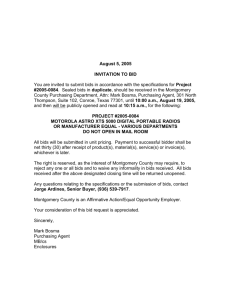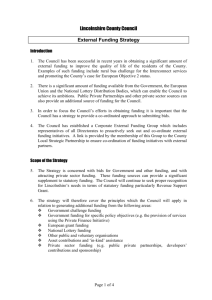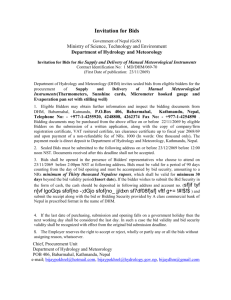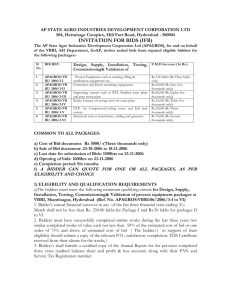BOGNOR REGIS TOWN COUNCIL EXTERNAL FUNDING POLICY
advertisement
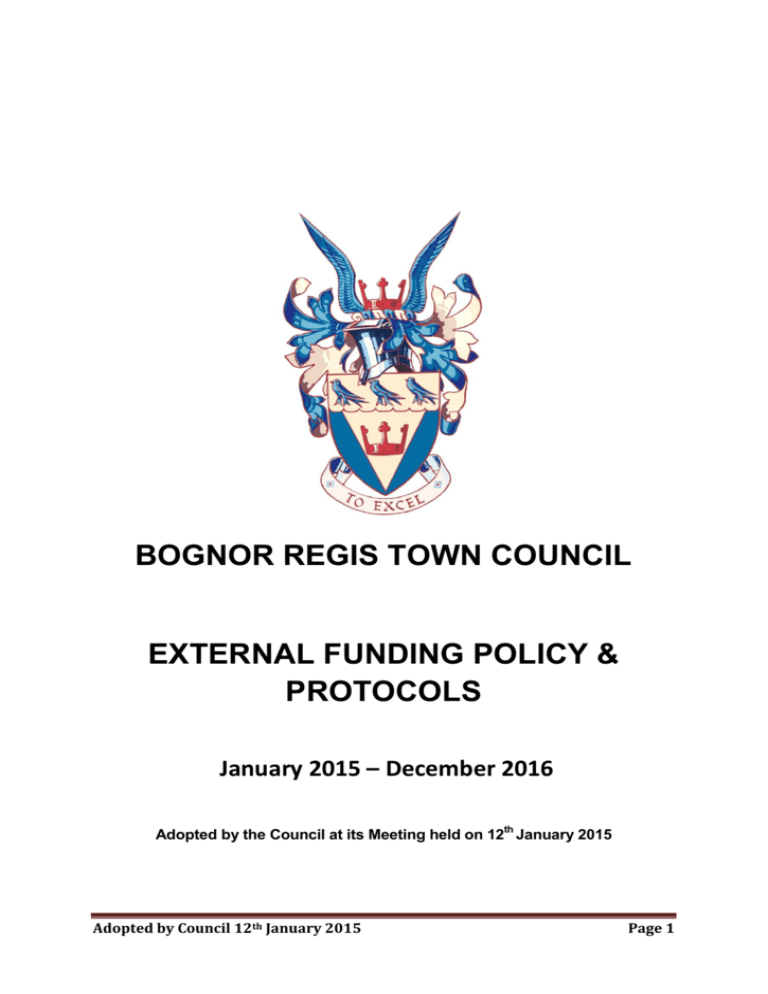
BOGNOR REGIS TOWN COUNCIL EXTERNAL FUNDING POLICY & PROTOCOLS January 2015 – December 2016 Adopted by the Council at its Meeting held on 12th January 2015 Adopted by Council 12th January 2015 Page 1 The context With the pressure for efficiency savings felt nationally, securing external funding is an opportunity to help bridge the gap and secure certain projects and activities and aid Bognor Regis Town Council meet its corporate vision. This policy and associated fundraising plans and strategies will be led by the Corporate Strategy for Bognor Regis Town Council: The Bognor Regis vision sets out a 3 year target to develop a clear Bognor Regis brand to become more powerful and enterprising, controlling its own destiny to deliver relevant and sustainable local services, develop community cohesion and create a happier Bognor Regis. The Town Council intends to do this through four priority areas: Priority 1: Promoting the Bognor Regis Brand and Town Area Priority 2: Partnership Working Priority 3: Take on more devolved services Priority 4: Acquiring and creating more community assets Why External Funding External Funding is available for: Capital and revenue projects Council led bids Voluntary and community sector led bids Partnerships bids In the main, funders expect core and statutory functions of local authorities to be funded through “regular” channels, such as council tax, revenue support grants, local fees and charges. Many funders also see discretionary services as an obligation for local authorities to deliver, such as leisure and cultural facilities and projects. Funders are especially interested in enabling additional services to be delivered or improving service quality, rather than in replacing core funding. What is External Funding? CIPFA’s* definition of External Funding is: “External Funding is seen as discretionary money not accounted for within the Formula Spending Share (FSS) or equivalent, distributed by various UK and EU agencies on a business case and/or competitive basis requiring an application.” (*Chartered Institute of Public Finance and Accountancy). The term “external funding” has a variety of possible interpretations and comprises a broad range of activities. Not all are carried out by the same organisations or individuals within them. Adopted by Council 12th January 2015 Page 2 For the purpose of this policy and to direct all work carried out by the Grant Finding Contract and ongoing, BRTC’s definition of External Funding includes the following funding sources outside the budgetary framework: Competitive Bids/Discretionary Grants - formal grant programmes that have established criteria for what will be supported, within which applicants have to follow the application procedure and are in competition with other applicants. For example, Lottery, European Funds, Trusts and Foundations Non-Competitive Bids/Discretionary Allocations - funding is nominally allocated to potential recipients, but an established application procedure needs to be followed and criteria fulfilled. For example, Children’s Play Programme (Lottery) Sponsorship - of a variety of initiatives across the council, such as museum exhibitions and roundabouts in return for a range of benefits including branding and acknowledgements. Partnership Funding - the partners of a project all agree to contribute a determined amount to fund or resource a project or initiative. The following sources of mainstream funding are not covered by this policy: Central Government Grant Allocations Local Area Agreements - negotiated funding from Central Government for delivering local services Section 106 Funding - developer contributions held by the Council for community enhancement projects Fees and charges made for use of Council services Local taxes Advertising Capital receipts obtained from the sale of surplus assets Adopted by Council 12th January 2015 Page 3 Challenges to securing external funding More than ever there are increasing opportunities for partnership working with voluntary and community groups and commercial partners to lever in funding for projects. Partnership working is key for BRTC to its success in securing any grants. As a town council, it is not eligible for various funds including from trusts and foundations (there are 7,500 in the UK alone awarding £2 billion of funds to charities). Where it can maximise its funding opportunities is from funders such as the Heritage Lottery Fund, Sport England, Awards for All and some EU funds. Working in partnership with other organisations including Arun DC and West Sussex CC will help BRTC to increase its chances of funding success, not least because there are limited resources at BRTC to manage projects and grants going forward. Purpose of an External Funding Policy This policy and protocols have been set out to establish a consistent corporate approach to bidding for external funding. This is not meant to unnecessarily hinder the bidding process, but instead establishes a best practice approach. It includes the process for identification of external funding opportunities, the roles and responsibilities of those involved in the process and the process for formal approval of bids. It also covers partnership bidding and how BRTC can build on its existing work with the local voluntary and community sector and other external agencies on funding bids. Bidding for external funding is a competitive process that requires a clear set of priorities and processes. Working with the Partners Partnership working with our local businesses, voluntary and community sector and other local authorities on funding bids is an effective way for local authority projects and bids to be secured. When Officers work with local groups they must ensure that: A member of the local Council for Voluntary Services is aware and involved in the bid, if appropriate. A Partnership/Community Use agreement is in place, outlining roles and responsibilities of all partners and individuals Expectations are managed and kept realistic, particularly where a group does not have past experience of bidding Managing Expectations It is vital that Council staff and Councillors understand the competitive nature of applying for external funds where demand exceeds supply and available funding is limited. Despite an ‘excellent and well-thought out application’ many funders still can’t meet demand. Therefore it is essential that there is provision if bids aren’t successful, as part of a risk assessment. “What happens next” if external funds aren’t secured must be a considered element of any action plan attached to a bid. Adopted by Council 12th January 2015 Page 4 Bidding for Funding Formal Approval to Bid During the process of developing grant bids the strategic impact of a successful grant will be considered and where it is in accord with existing Council policy and can be delivered within existing financial and human resources then bids (within the agreed definition) only require approval from the Town Clerk. Where there is a strategic impact either in terms of policy or resources (such as staffing costs, acquiring assets) the bid must be referred to the Policy & Resources Committee before being signed off. All bids must be signed off by the Town Clerk before they are sent to the funder. In all cases relating to grant bids there will be full compliance with the Councils Standing Orders, Terms of Reference and Financial Regulations having particular regard to letting of contracts. In all cases prior to written acceptance of a successful grant bid a brief analysis will be prepared by the Town Clerk confirming the impact of accepting the grant. Where it is considered that the grant could impact on existing policies and resources, the Town Clerk will refer the matter to the Policy & Resources Committee. Where there is no impact the Town Clerk will sign the acceptance. Where a bidding opportunity is not pursued this will be recorded by the Grant Finding Service, the reasons why and ratified by the Town Clerk. Exceptional Circumstances When assessing whether to respond to tight deadlines, the lead project officer in consultation with the Grant Finding Service needs to consider: Whether there are the resources to develop an effective funding bid are available within the timeframe Whether the opportunity will divert resources away from more important priorities Whether effective consultation and partnership arrangements can be established within the timeframe Progress of grants including expenditure will be reported to the Policy & Resources Committee as part of the regular performance monitoring reports. Thank you and Follow up It is vital that the Grant Finding Service or other identified Lead Project Officer respond within 24 hours of notification of a bid being successful and within 2 days regarding unsuccessful bids. A phone call should be made, followed up by a letter in both outcomes. It is important that we note the reasons for rejected bids to assist future bids applications and prioritisation. Adopted by Council 12th January 2015 Page 5 Exit/Forward Strategy All Council applications for funds must include an Exit/Forward Strategy. This must demonstrate that either: the project and its costs cease at the end of the grant, or that alternative arrangements for funding can be made that do not call upon Council funding/or have Council approval to pick up ongoing revenue costs. Monitoring and Evaluation Thorough and relevant evaluation and monitoring is essential to the ongoing success of the Councils attracting funds and is an integral part of the bidding process: What aspects of the project are to be evaluated How the evaluation will be conducted Whether the evaluation will be internal or external and if there are any associated costs Where possible and appropriate, the cost of conducting any special evaluation and monitoring requirements should be included in the project costs. All of this must be considered within the context of each bid and the proportion of evaluation material needed dependent on the size of the grant. Monitoring and evaluation of projects should be led on by the Grant Finding Service, with support from the lead Project Officer as appropriate. Reporting The Grant Finding Service will provide monthly reports to the Town Clerk regarding the status of bids and associated activities of the post holder. This will enable priorities and the progress of external funding to be discussed at regular intervals. Risk Management There are many opportunities for the Council and its partners to bid for external funding but the ‘dash for cash’ should be avoided if the programme does not meet the key priorities of the Council and its partners. The Grant Finding Service is responsible for risk assessing the funding arrangements for the project, with support and scrutiny from the Town Clerk, as well as the project itself, using the Council’s Risk Management procedures. In particular, attention needs to be given to: The reliability of the funding source(s) needs to be assessed, especially if it is a multi-year project Commitments for match funding need to be considered and secured if necessary Claw back clauses in funding agreements must also be considered carefully to ensure the Council is not unduly exposed to financial risk should the project fail to deliver Consideration must be given to how the project benefits can be sustained beyond the funding life of the project. Adopted by Council 12th January 2015 Page 6 Funding should not be sought or accepted from sources whose activities conflict with the Council’s objectives and priorities. The risk assessment should link to the exit strategy to determine whether the project will cease when funding is discontinued or how the Council will otherwise continue the project from revenue resource. External Funding Working Group The group’s aim is to provide a forum for key staff members at BRTC to share information, knowledge, skills and resources in external funding applications and opportunities. Also, to strengthen partnership working between departments and partner organisations and increase inward investment through the Council as well as for partnership projects in the local community. This group will make recommendations to the Policy & Resources Committee on any amendments to the External Funding Policy and will be a useful forum to disseminate funding opportunities to staff, as well as looking at the following key areas: Priority setting Project idea generation Collating information on pending bids Skill sharing Sponsorship - who is talking to who in the business community Work on applications as a group, where appropriate. These meetings will be quarterly, according to need, workload and current priorities. (See Appendix 1 for Terms of Reference and composition). Adopted by Council 12th January 2015 Page 7

